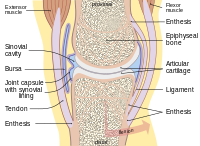
Photo from wikipedia
The clinical characteristics of cutaneous lupus erythematosus (CLE) are well delineated in adults, but pediatric data, particularly in Asian populations, are limited. Therefore, we evaluated the characteristics of pediatric cases… Click to show full abstract
The clinical characteristics of cutaneous lupus erythematosus (CLE) are well delineated in adults, but pediatric data, particularly in Asian populations, are limited. Therefore, we evaluated the characteristics of pediatric cases by retrospectively reviewing the medical records of children with CLE during a 15-year period in a tertiary care dermatology clinic in South Korea. The study included 21 children (8 males and 13 females), 4 of whom had neonatal lupus erythematosus (NLE). Among 17 patients with CLE, discoid lupus erythematosus (DLE) was most common (47.1%), followed by acute CLE (ACLE, 35.3%). All ACLE cases had systemic lupus erythematosus (SLE). Female predominance was conspicuous in ACLE/SLE (6/11 females versus 0/6 males), as was older age, whereas DLE and NLE showed near-equal sex distributions. The median age at the diagnosis of CLE was significantly higher in females than in males (15 years versus 4.5 years, p = 0.02). All patients with ACLE/SLE simultaneously showed skin and systemic symptoms from onset. The kidney was the most commonly involved organ. This study revealed unique characteristics of pediatric CLE, further warranting a comprehensive review among various ethnicities to understand the wide spectrum of CLE in the pediatric population.
Journal Title: Lupus
Year Published: 2019
Link to full text (if available)
Share on Social Media: Sign Up to like & get
recommendations!